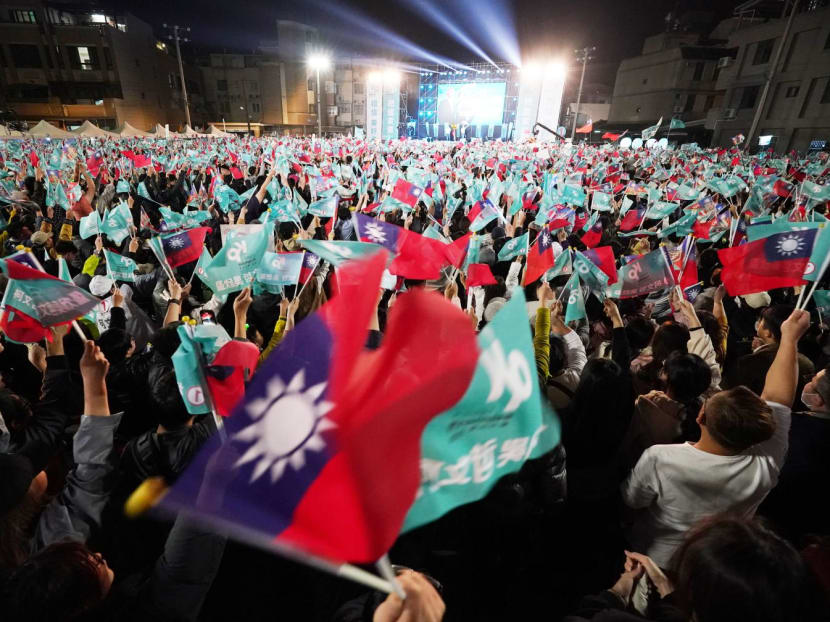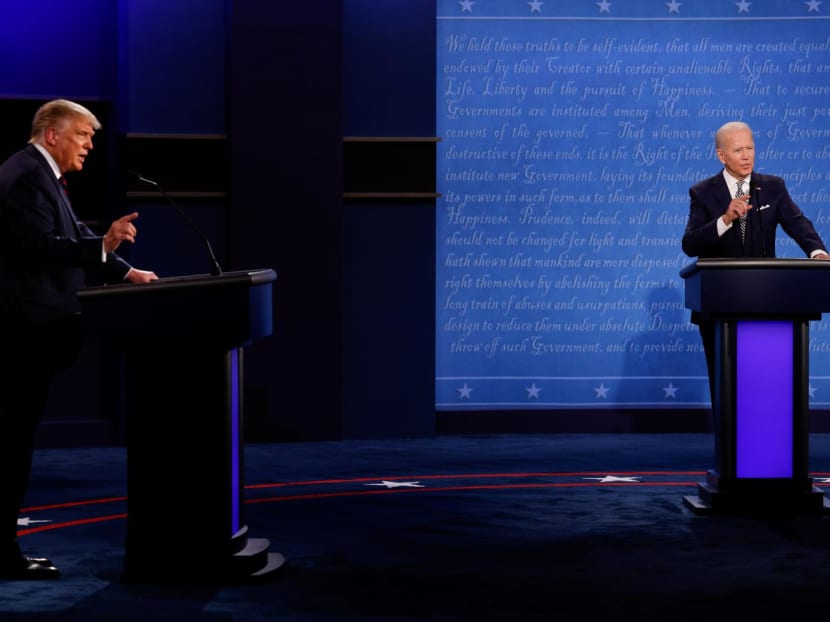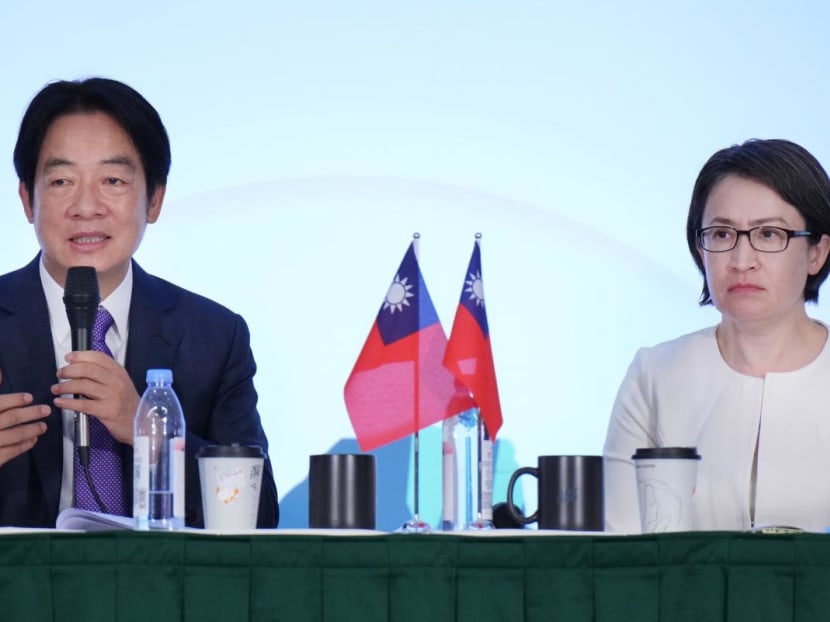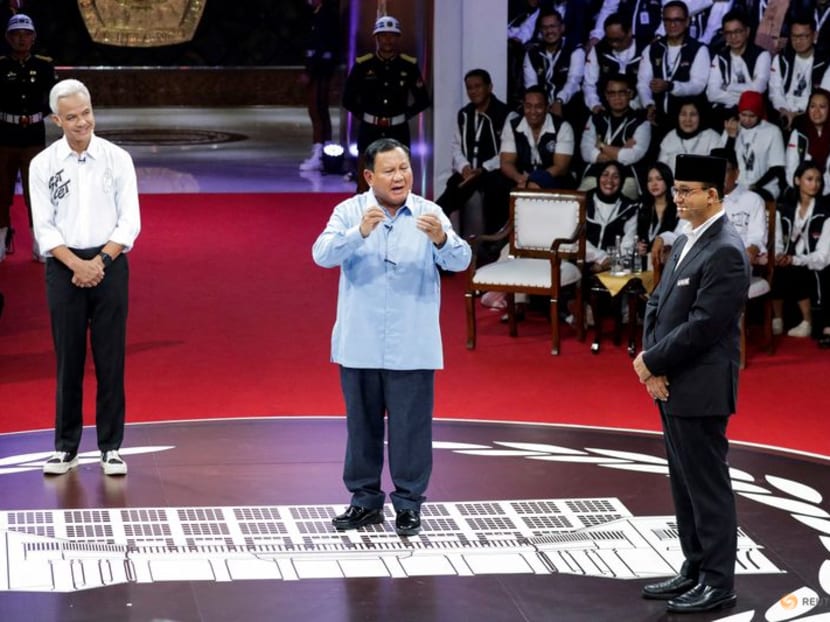Commentary: Much is at stake in 2024 elections in US, Taiwan, Indonesia and India. What does this mean for Singapore?
A number of forthcoming major popular elections are likely to evince short- to medium-term ramifications for the world, the Southeast Asian region, and, of course, Singapore.

Supporters at a rally by Taiwanese presidential candidate Ko Wen-je in Taichung City, Taiwan on Jan 6.
2024 is likely to be another tumultuous year: The world has barely recovered from the socioeconomic storms of past years compounded by the Covid-19 pandemic, and may soon enter into yet another whirlwind.
The geopolitical fronts, especially, do not relent, with a number of forthcoming major popular elections – in the United States, India, Taiwan and Indonesia, among others – that are likely to evince short- to medium-term ramifications for the world, the Southeast Asian region, and, of course, Singapore.
When Americans go to the polls in early November, they are, in a sense, voting on the world’s behalf. The presidential contest will likely rematch former president Republican Donald Trump against incumbent Joe Biden or, if President Biden decides to withdraw due to low approval ratings or unforeseen health reasons, an eleventh-hour Democratic candidate.
A DEMOCRATIC PRESIDENCY AND GLOBAL CONFLICT
A Democratic squeeze-through will continue to situate much of the world squarely in a by now familiar yet still uncomfortable position. The conflicts in Ukraine and Gaza look set to drag on, both underlined by almost unqualified American support of one warring party over the other.
The US-China confrontation will likely persist, with relative ideological superiority placed high on the mutually excluding agendas of both superpowers. Countries big and small will be nudged, sometimes not so subtly, into taking sides, at least in the increasingly decoupled economic and technological sectors.
In such a scenario, Southeast Asia, as a rising economic and a geostrategic heavyweight, would have to continue to edge out a manoeuvring space for itself amid the big-power contestations.
Singapore, in particular, would need to continue to tread gingerly in its rather ambitious venture of reconciling China and the US, or at least in availing itself of both major powers’ benefits as it clings to its status as a financial and trading hub.
A TRUMP WIN — STRANGE RELIEF?

On the other hand, a Trump re-entry into the White House could eventually bring about a strange sigh of relief for both Americans and the world.
Despite being a controversial figure, Mr Trump is ultimately a pragmatist, and most importantly, a businessman who despises anything that is “bad for business” — prolonged violent conflicts included. He tends to de-ideologise foreign-related issues, instead preferring to monetise them.
On Ukraine, Mr Trump is likely to attempt to personally cut a deal with Russian president Vladimir Putin, and pressure the Ukrainian side to accept it by using the threat of withdrawal of American support.
The American stand-off with China will likely be much softer on the ideological front, but refocus on what Mr Trump perceives to be inequitable Chinese trading advantages, which are more tangible and thus more susceptible to resolution, even if only temporarily.
Onlooking countries may no longer feel acute pressure to choose sides as much — more so because Mr Trump eschews most forms of American alliance with even traditional allies, and much prefers the US to go it alone.
Singapore could benefit from a US-China rapprochement, but would instead have to work hard to retain its traditionally close ties with Washington.
STATUS QUO IN TAIWAN
Across the Pacific, Taiwan will choose its new president on Jan 13. Current Vice-President Lai Ching-te, of the independence-leaning Democratic Progressive Party, is likely to edge out his presidential rivals Hou Yu-ih of Kuomintang and Ko Wen-je of Taiwan People’s Party who are more inclined towards reunification with mainland China in various shades and hues.

Mr Lai has repeatedly vowed to continue with incumbent President Tsai Ing-wen’s policy of not changing Taiwan’s status quo, but this is perhaps no longer sufficient to placate an increasingly strident China that nowadays demands proactive reunifying desire from the Taiwanese side as precondition for negotiations, and seems to subtly succour and root for Mr Lai’s opponents.
Should Mr Lai emerge victorious, during at least the early part of his term, China is likely to at least maintain if not step up the frequency and intensity of its constant “patrols” by military ships and aircrafts around Taiwan.
As the US is also assiduously arming Taiwan for self-defence — even stationing some personnel on the island — run-ins or skirmishes between China and Taiwan could involve the Americans.
In such a scenario, US-China confrontations would be escalated, and regional neighbours would be even harder-pressed to choose sides during a Biden presidency that lasts until at least early next year.
In this event, it remains to be seen if Singapore would still be able to provide a dialogue forum for parties on both sides of the Taiwan Strait.
RELIGIOUS CONSERVATISM IN INDONESIA
Closer to home, Indonesia will hold its presidential and legislative elections in February. The race pits Defence Minister Prabowo Subianto of the Gerindra Party, widely regarded as the current frontrunner, against former Jakarta governor Anies Baswedan and Central Java Governor Ganjar Pranowo of the ruling Indonesian Democratic Party-Struggle (or PDI-P).

As a G20 member, the largest Southeast Asian economy, and the most populous Muslim-majority country in the world, Indonesia and thus the outcome of its polls would likely have an outsized influence on the region and the world. This is especially so with regards to religious revivalism in the Muslim world.
If both a piously inclined candidate and a religiously inspired parliamentary majority emerge victorious at the Indonesia polls, the new administration will likely prioritise matters more spiritual than material, both in domestic and foreign affairs.
It will also further fuel the euphoria, stamina and ambition of Islamic revivalism or at least its milder manifestation of political Islam. Whatever the outcome of Indonesia’s elections, her neighbours, including Singapore, would have to remain vigilant against the attendant rise of religious conservatism in all its guises.
INDIA AND CAUTIOUS TOLERANCE
Further afield in India, the Bharatiya Janata Party (BJP) and its charismatic leader Narendra Modi are expected to again ride to electoral victory by the middle of the year.
So far, the unreservedly ethno-nationalist attitude of the BJP government has largely been confined to India’s domestic scene, the sizeable worldwide Indian diaspora notwithstanding.
Paradoxically, a more awakened and assertive Indian foreign policy, especially vis-à-vis Southeast Asia, may at least be cautiously tolerated by the region, not the least as a welcomed regional counterbalance against what is increasingly perceived to be a rising Chinese hegemony.
With these significant polls dotting the year, the least that Southeast Asia in general and Singapore in particular could do is to nurture its economic resilience and remain clear-eyed about what constitutes their best interests in a tumultuous world.
ABOUT THE AUTHOR:
Oh Ei Sun is a principal adviser of Pacific Research Center of Malaysia and senior fellow at Singapore Institute of International Affairs.









